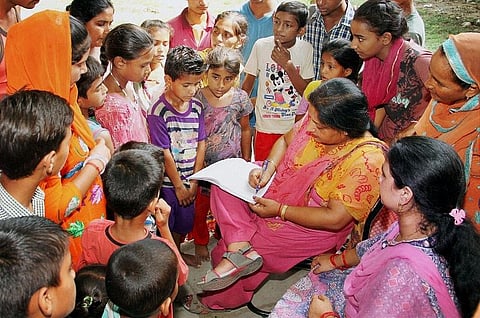

Tamil Nadu introduced English as a medium of instruction in its government schools in the academic year 2012-13. In line with this scheme, most government schools in the state have separate English medium sections in their schools, in parallel with the Tamil medium sections. As of today, there are around 5,700 government schools in Tamil Nadu that have English medium classes employing around 6,000 teachers to teach the students who enroll for English medium instruction.
However, seven years after the introduction of the scheme, several experts point out that the process to prepare teachers has been lacking.
Tamil Nadu’s School education department conducts annual trainings for all its teachers in a decentralised manner to help them brush up their skill sets. “These trainings include special training for teachers teaching in English medium sections as well,” says a senior official from Tamil Nadu SCERT on the condition of anonymity, “But they are not effective.”
Speaking about the training camps, a government school teacher in Tamil Nadu with over 20 years of teaching experience says she has strong reservations about the manner in which the government conducts them. “The trainings were conducted for 15 days earlier, gradually it has come down to five days in a year. Since English medium was introduced in government schools only a few years ago, we are yet to see how the training schedules are designed to accommodate those needs too,” she says. The training camps are mostly meet-and-greet sessions for teachers working in nearby schools. There isn’t much to take away from such camps, she adds.
“The teachers are not given any resource materials during the training. How do they expect them to remember or work on anything that they are being trained on?” a resource person who works in the government education sector asks.
The TN government recruits teachers through a qualification examination called the Teachers Eligibility Test (TET). TET has two papers – one for primary school teacher aspirant and one for middle school teacher aspirant. Those aspiring to teach primary classes will need to take a general test consisting of a pedagogy, regional language, Maths, English and science and the exam for the aspirants for middle school teaching posts will take pedagogy, regional language and English apart from their subject of interest. A good number of teachers who are recruited by the government of Tamil Nadu after TET have pursued their education in Tamil, and are not given any further training to teach in English.
When asked about the process of deputing teachers to teach in English medium classes in government schools, the SCERT official says that there is no set process. “We just assign teachers based on the need in that particular school. There is no test conducted before deputing teachers to English medium classes,” the officer says, adding that the deputation is not voluntary either.
“How are teachers expected to pick up a new language/skill set in a mere 5-day training?” the official asks.
Is there a solution in sight?
An educationist and trainer who has conducted trainings for government school teachers in the past points to a lack of will and accountability among those in the highest rungs of decision-making in the School Education department. “The trainings are supposed to have a goal. But right now, the goal is only to conduct training sessions. Who will monitor what is being imbibed by the teachers and whether it is being properly passed on to students?” he asks.
“Setting a numeric target will lead to uncomfortable questions if the goal is not met. That is precisely why they don’t quantify goals,” he adds.
“One feasible solution is to monitor the implementation of trainings and track the teachers’ progress closely for two years. The government should also conduct review sessions and keep the schools alert and active for two years at least. Only then results will start to show,” he says.